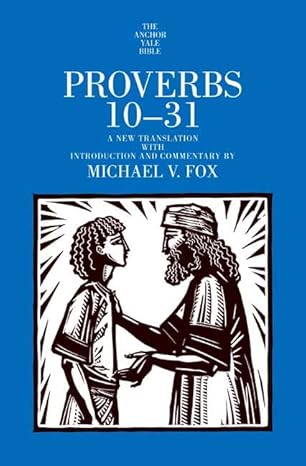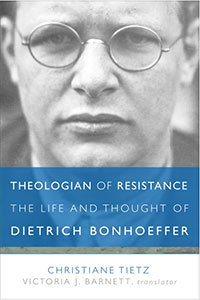Our book club at Greenfield will be discussing Christiane Tietz’s, Theologian of Resistance: The Life and Thought of Dietrich Bonhoeffer (trans. Victoria J. Barnett; Fortress Press, 2016) at the end of the month. I wanted for the group to read something on Bonhoeffer since there is a new movie about him recently released (Bonhoeffer: Pastor. Spy. Assassin). The movie has been (rightly IMHO) criticized for it’s interpretation of Bonhoeffer’s legacy, and so I thought it would be good to read a well-researched, balanced (and short) biography together.
The book tells the story of Bonhoeffer’s life chronologically, with the hope “to present Bonhoeffer in the context of his times, not avoiding the critical questions about his life and work” (viii). I especially appreciate how Tietz integrates discussions of Bonhoeffer’s writings at the appropriate places to even tease out the development in his thought over time.
In chapter two, Tietz highlights the essential communal nature of Bonhoeffer’s faith. This is somewhat surprising as he was raised religious, but with little connection to the institutional church. Bonhoeffer decided to study theology and his doctoral dissertation, published as Sanctorum Communio, looked at the sociology of the church. This is where he developed his conviction that we “are truly human only when in our encounter with another we recognize our responsibility toward the other” (10). And this being in community is found in Jesus: “Christian community means community through Jesus Christ and in Jesus Christ” (11; quoting Life Together, 31).
Chapter three explores Bonhoeffer’s time as a minister in training in Barcelona and Berlin and as a student in New York before the war. It is during this period that his theology continued to take shape. He began to appreciate an ecumenical Christianity (as opposed to the nationalistic one beginning to develop in Germany around the same time) as well as a distinction between religion and Christian faith. In a lecture in Barcelona he noted: “If human beings and God are to come together, there is but one way, namely, the way from God to human beings” (16). Further, this vital relationship with God is where one grounds concrete ethical behaviour, in contrast to abstract moral principles. During this time his peace ethic also developed, as a result of his developing interest in the Sermon on the Mount. For Christ followers, allegiance to Jesus takes priority over allegiance to any nation. Christians should never fight against one another, as we have the same father in heaven and the church should be exhibit a worldwide unity, “beyond national interests” (21). Finally, his time in New York also exposed him to the “social gospel.” While he complained about a lack of theological and biblical reflection at Union Seminary, he was impressed with how seriously they took social, economic, and political issues.
In chapter four, Tietz narrates a number of “firsts” in Bonhoeffer’s life. His first personal encounter with Karl Barth, his first ecumenical engagement at the (Christian) World Alliance, his first pastoral position, and his first lecturer position at the University of Berlin. Near the end of this period he also experienced a conversion of sorts: he wrote to a friend, “For the first time, I came to the Bible” (33). Tietz notes how an orientation towards the Bible became increasingly important for Bonhoeffer” “We no longer read the Bible seriously. We read it no longer against ourselves but only for ourselves” (34)
He took this new conviction into the beginning of the church struggle with the rise of Hitler in 1933, which Tiertz describes in chapters five through seven. Bonhoeffer was a strong voice in the opposition to the Christian nationalism that overtook the German church during these years. This led him to return to Germany (he had taken a pastorate in London) at the request of the Confessing Church Council to found and direct a new seminary for the Confessing Church. It was during this period that Bonhoeffer wrote his most influential book, Discipleship (1937), based on his teaching at the seminary. His emphasis on following Jesus in a life of costly discipleship takes on new meaning considering the context in which it was written. Tietz notes how Bonhoeffer, focusing on the Sermon on the Mount, emphasized the need for both faith and obedience. She sums up his thought: “It is an illusion to think that faith does not have to lead to a changed life” (62).
In 1937 the Gestapo shut down the seminary and forced the teaching and training of pastors underground. This led Bonhoeffer to write his book, Life Together, which brings together his thoughts on the collective spiritual life that he tried to foster among the students at the seminary. As the Confessing Church came under more pressure, including a mandate for all pastors to swear an oath of loyalty to Hitler, Bonhoeffer felt that there was really no choice but to remain faithful and not swear the oath. That being said, Bonhoeffer fled to safety in the U.S., but not even two months later returned to Germany because of his conviction that he needed to stand with the Christian people of Germany.
Chapters nine and ten cover the final five years of Bonhoeffer’s life. The big question from this period is how much (if at all) did his theological and ethical views (like the pacifism he articulated in Discipleship) change during this time. Bonhoeffer knew of the planned coup through his brother-in-law, and accepted a position in the Military Intelligence in Munich so that he could use his ecumenical contacts convey information about the coup and planned postwar reconstructions church leaders abroad. These actions implicated Bonhoeffer and led to his arrest and imprisonment in 1943. His ethical reflections (which were posthumously published as Ethics) wrestled with questions those in the resistance – and Bonhoeffer himself – were facing. Tietz notes that Bonhoeffer surprisingly did not reach the conclusion that murder at times may be permissible (86-87), nor did he abandon his pacifism. In a letter written right after the failed assassination attempt, he wrote, “Today I can see the dangers of that book [i.e., Discipleship], though I still stand by what I wrote.”
Tietz’s final chapter, “A Modern Saint?”, explores the reception of Bonhoeffer’s life and thought throughout the world. She notes: “When one observes the reception of Bonhoeffer it is immediately striking to see how strongly people from very different theological backgrounds and sectors in the Christian world have adopted him for their own purposes” (111, italics mine). This was a fascinating — and humbling — chapter. Fascinating because the sheer breadth of his influence is remarkable; humbling, because people (like myself) tend to pick and choose what parts of Bonhoeffer’s life and thought they want to emphasize. This highlights perhaps the biggest benefit of Tietz’s work, as she seeks to embed his thought in the context of his life (this fits well with Bonhoeffer’s own insistence that theological reflection needs to be concrete and not abstract). Consequently, one cannot simply adopt Bonhoeffer’s positions without considering that he was a child of his times.
In the last few pages, Tietz suggests some enduring lessons from Bonhoeffer’s life and thought; “taking note of the impulses that can stimulate our own thoughts and judgements about our very different situation today” (118). First, she notes how Bonhoeffer is an example of a humble theologian who was open to reexamine his own views and convictions. “He reexamined his own ideas and convictions when they no longer seemed suited for new situations” (118). His constant question was, “What is Christianity, or who is Christ actually for us today” (119, quoting Letters and Papers from Prison, 362). Second, Bonhoeffer’s commitment to Christ was always held together with a commitment to the church. The church is absolutely necessary for Christian life, as “Christian community means community through Jesus Christ and in Jesus Christ” (119, quoting Life Together, 31). Finally, she notes how this church must “be there for others.” “Because its primary task stands outside the political realities, the church is able to remind the state of its own task” (119) by offering a “public theology” for the common good.
In sum, I found Tietz’s biography of Bonhoeffer insightful and thought-provoking — far more than one would expect considering its length (just over 120 pages excluding end matter). I would highly recommend it as a entry way into the study of the life and thought of Dietrich Bonhoeffer.
 Fox was an expert on the wisdom literature of the Hebrew Bible (among other things), publishing many works, including his second-to-none two volume commentary on the Book of Proverbs in the Yale Anchor Series. I recall fondly a special dinner in New Orleans with Michael organized by John Hobbins at the publication of the second volume in 2009.
Fox was an expert on the wisdom literature of the Hebrew Bible (among other things), publishing many works, including his second-to-none two volume commentary on the Book of Proverbs in the Yale Anchor Series. I recall fondly a special dinner in New Orleans with Michael organized by John Hobbins at the publication of the second volume in 2009.
